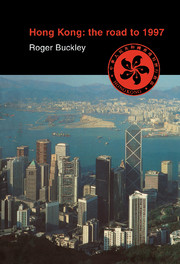Book contents
- Frontmatter
- Contents
- Preface
- Acknowledgements
- Glossary
- Map: Hong Kong, 1997
- Introduction: prewar colony
- 1 Reoccupation: postwar comeback, 1945–7
- 2 Consolidation: the Grantham years, 1947–58
- 3 Growth: the 1960s
- 4 Transformation: the MacLehose years, 1971–82
- 5 Negotiations: Sino-British diplomacy, 1982–92
- 6 Confrontation: the Patten years, 1992–5
- 7 Future: to 1997 and beyond
- 8 Conclusions: endgame
- Appendixes
- Bibliography
- Index
4 - Transformation: the MacLehose years, 1971–82
Published online by Cambridge University Press: 20 November 2009
- Frontmatter
- Contents
- Preface
- Acknowledgements
- Glossary
- Map: Hong Kong, 1997
- Introduction: prewar colony
- 1 Reoccupation: postwar comeback, 1945–7
- 2 Consolidation: the Grantham years, 1947–58
- 3 Growth: the 1960s
- 4 Transformation: the MacLehose years, 1971–82
- 5 Negotiations: Sino-British diplomacy, 1982–92
- 6 Confrontation: the Patten years, 1992–5
- 7 Future: to 1997 and beyond
- 8 Conclusions: endgame
- Appendixes
- Bibliography
- Index
Summary
We can now raise our sights to the achievement of reasonable conditions of life for all. (Sir Murray MacLehose, Far Eastern Economic Review, 8 July 1972)
In 1980 HSBC had completed a period of extraordinary growth. Net published profits doubled between 1960 and 1967, 1967 and 1971, 1971 and 1975, 1975 and 1978, and 1978 and 1980. This indicates quite clearly an accelerating rate of growth; true net earnings were considerably higher. (Frank King, The History of The Hongkong and Shanghai Banking Corporation, vol. iv)
Personalities matter. In a small city-state such as Hong Kong the role of its governor is inevitably under constant scrutiny and attracts ceaseless press comment. Sir Murray MacLehose was selected from the Foreign Office to lead Hong Kong in the critical decade that saw a shift from the conventional laissez-faire approach towards economics and administration to a more interventionist era that ended with the first concerted attempt to confront the problems associated with the territory's future. MacLehose's lengthy period in office from the autumn of 1971 to the spring of 1982 was to prove a watershed in Hong Kong's postwar history. By the time he left Government House, Hong Kong was firmly established on the road to 1997.
Yet Governor MacLehose's reputation today in Hong Kong rests very largely on his domestic achievements. It is what he did to alter the seemingly set methods that determined what should or should not be attempted by the bureaucracy that has become his enduring legacy.
- Type
- Chapter
- Information
- Hong Kong: The Road to 1997 , pp. 84 - 103Publisher: Cambridge University PressPrint publication year: 1997



